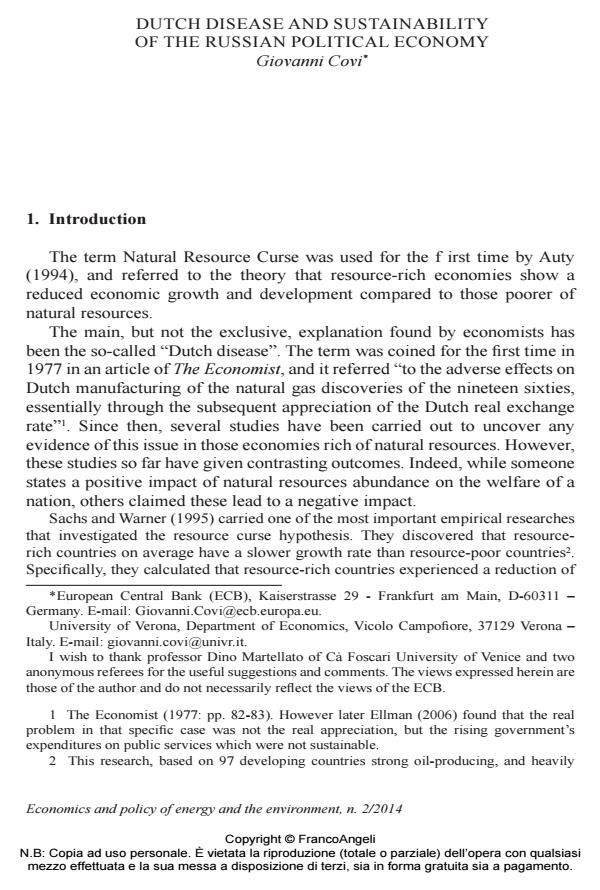Dutch disease and sustainability of the Russian political economy
Titolo Rivista ECONOMICS AND POLICY OF ENERGY AND THE ENVIRONMENT
Autori/Curatori Giovanni Covi
Anno di pubblicazione 2015 Fascicolo 2014/2
Lingua Inglese Numero pagine 36 P. 75-110 Dimensione file 458 KB
DOI 10.3280/EFE2014-002005
Il DOI è il codice a barre della proprietà intellettuale: per saperne di più
clicca qui
Qui sotto puoi vedere in anteprima la prima pagina di questo articolo.
Se questo articolo ti interessa, lo puoi acquistare (e scaricare in formato pdf) seguendo le facili indicazioni per acquistare il download credit. Acquista Download Credits per scaricare questo Articolo in formato PDF

FrancoAngeli è membro della Publishers International Linking Association, Inc (PILA), associazione indipendente e non profit per facilitare (attraverso i servizi tecnologici implementati da CrossRef.org) l’accesso degli studiosi ai contenuti digitali nelle pubblicazioni professionali e scientifiche.
The paper aims at investigating the dependency of the Russian economy on natural resources, underlining the causes and the possible consequences of this growth strategy. The analysis tries to evaluate if the Russian manufacturing has contracted the "Dutch Disease", that is, if a boom in the oil and gas industry has led to a process of de-industrialization, directly through the resource movement effect and indirectly through the spending effect. In this investigation it will be emphasized the role played by the learning curves as a crucial factor in determining the comparative advantages of a country, and why an excessive reliance on exports of a single product may reduce the welfare of a nation in the long run. The research underlines how the structure of the Russian economy has been built to favor the energy industry instead of the manufacturing one. This strategy has strengthened the comparative advantage that Russia enjoyed in natural resources, so as to reduce the return on investment in the manufacturing sector, which has had to struggle also with the constant appreciation of the exchange rate. This, in the end, has produced the so called de-industrialization process, which has transformed Russia into a service-based economy. The problem resulting from this is that, when a shock happens, the economy is no more able to soften its effects. To absorb the shock, it is necessary a higher government’s expenditure or switching to a higher level of unemployment, producing instability and volatility in the country.
Parole chiave:Sustainable Development, Russia, Dutch Disease, natural resources, energy economics, economic growth
Jel codes:E52, P28, O11, Q32, Q33, Q43
- Doğal Kaynak Rantları, Bilgi ve İletişim Teknoloji Kullanımı, Finansal Küreselleşme ile Ekonomik Büyüme Arasındaki İlişkinin Analizi: BRICS Ülkeleri İçin Bir Uygulama Ayşegül Han, Özge Korkmaz, in Ankara Hacı Bayram Veli Üniversitesi İktisadi ve İdari Bilimler Fakültesi Dergisi /2024 pp.995
DOI: 10.26745/ahbvuibfd.1412106 - Trade interdependence between Russia vs. the European Union and China within the context of the competitiveness of the Russian economy Krzysztof Falkowski, in Equilibrium. Quarterly Journal of Economics and Economic Policy /2018 pp.667
DOI: 10.24136/eq.2018.032 - Reduction Of An Economy's Raw Material Dependence And The Human Capital Of A Country Viacheslav Perepelkin, Elena Perepelkina, in Comparative Economic Research. Central and Eastern Europe /2017 pp.53
DOI: 10.1515/cer-2017-0004
Giovanni Covi, Dutch disease and sustainability of the Russian political economy in "ECONOMICS AND POLICY OF ENERGY AND THE ENVIRONMENT" 2/2014, pp 75-110, DOI: 10.3280/EFE2014-002005